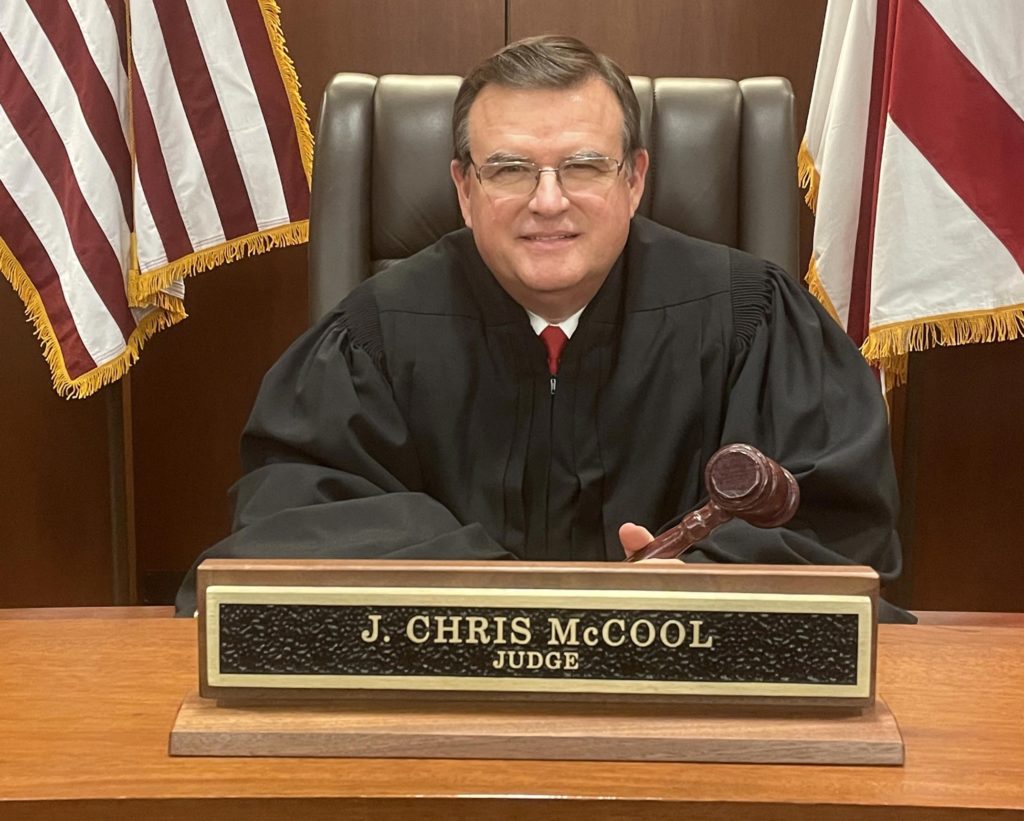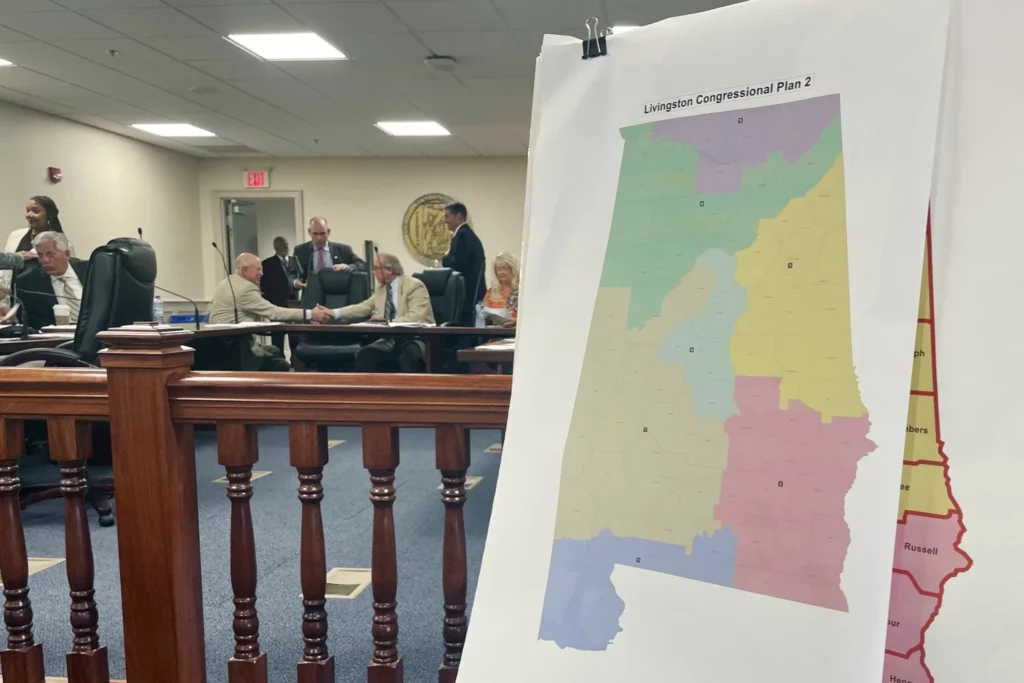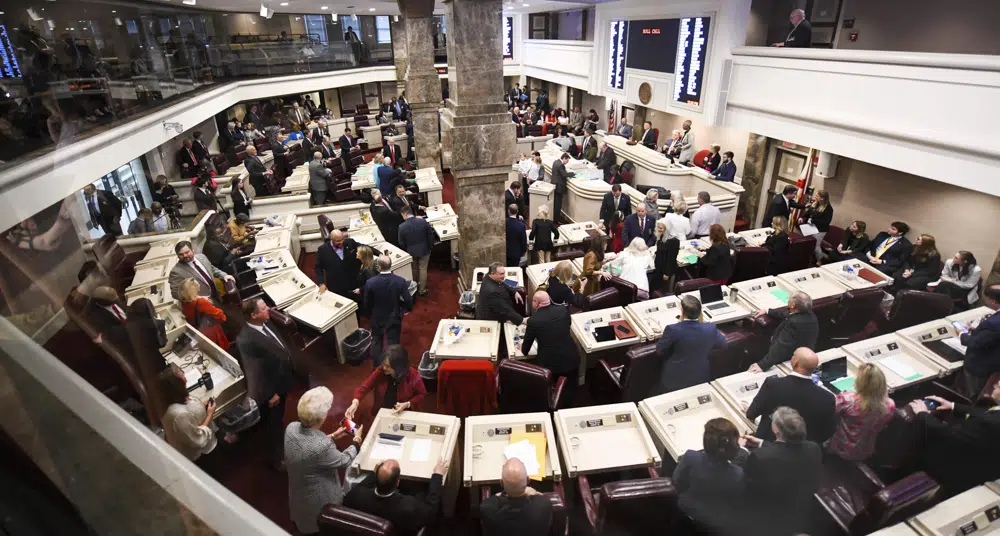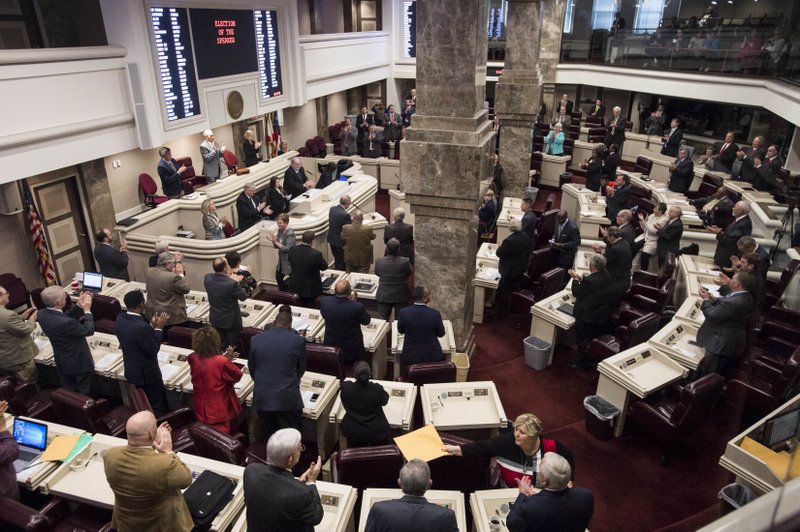Pell City holds annual law enforcement appreciation luncheon

The City of Pell City recently held its annual law enforcement appreciation luncheon sponsored by Metro Bank owner Annette Cox. The annual event was held at the Pell City municipal complex. Cox expressed her pleasure at being able to host this event to honor the members of law enforcement in the community. The annual event honors law enforcement for making Pell City and St. Clair County a great place to live, work, and raise a family. The luncheon featured steak entrees with a wide selection of cakes for desserts. St. Clair County Commission President Stan Bateman (R) said, “This community is so special. Metro Bank and Ms. Annette Cox steps up and does this every year to show all of our appreciation of what you in law enforcement do for our community. If you drive around the county and see all the commercial development that’s going on, if you will look at the sign in front of the project Metro Bank is the one providing the financing for a lot of it. I want to give Metro Bank a round of applause.” Bateman spent his career law in enforcement, having spent decades as a game enforcement officer for the Alabama Department of Conservation and Natural Resources (ADCNR). Bateman said that the biggest change he has seen since his early days in law enforcement is the adoption of technology. “I didn’t have any of the technology and tools that you have today,” Bateman said. “In my day, I just had to recognize people by the back of their heads.” Members of the Pell City Police Department and St. Clair County Sheriff’s Department were on hand to be honored. Several dignitaries were present including Associate Alabama Supreme Court Justice Sarah Stewart. Stewart, who was being escorted that day on a tour of St. Clair Counties by St. Clair County Presiding Judge Phil Seay, expressed her support for the law enforcement community and all that they do for the people of Alabama. Stewart is a candidate for the Republican nomination for Chief Justice of the Alabama Supreme Court. Stewart faces two Republican opponents in the March 5 Republican primary: former State Senator Bryan Taylor and Jerry Michael Blevins. The eventual Republican nominee for Chief Justice will face Democratic nominee Montgomery Circuit Judge Greg Griffin in the November 5 general election. State Sen. Lance Bell (R-Pell City), State Representative Randy Wood (R-Anniston), Rep. Craig Lipscomb (R-Gadsden), Rep. Jim Hill (R-Odenville), Probate Judge Andrew Weathington, Commissioner Ricky Parker, Commissioner Bob Mize, Commissioner Tommy Bowers, Sheriff Billy Murray, Circuit Judge Bill Weathington, St. Clair County School Board President Bill Morris, Revenue Commissioner Ken Crowe, Circuit Clerk Kathryn Burke, St. Clair County Republican Party Chairman Deputy Freddy Turrentine, St. Clair County Young Republican Chairman Logan Glass, and former St. Clair County Republican Party Chairman Joey Stevens. To connect with the author of this story or to comment, email brandonmreporter@gmail.com.
Jim Hill endorses Supreme Court candidate Chris McCool

Judge Chris McCool spoke recently at a meeting of the St. Clair Republican Party meeting. McCool, a Republican, presently serves on the Alabama Court of Criminal Appeals. He is running for an open spot on the Alabama Supreme Court. State Representative Jim Hill (R-Odenville), a former circuit judge and the chairman of the House Judiciary Committee, introduced McCool. “He lives on the same farm he grew up on,” Hill said of McCool. “He has been married for thirty years and has four children. He is a former District Attorney.” “He graduated from the University of Alabama summa cum laude,” Hill said. “With those kinds of credentials, he could have gone to any of the biggest law firms in the country or gone to Wall Street. He didn’t go to Wall Street; he went back to Gordo.” “I wholeheartedly endorse him to be on the Alabama Supreme Court,” Rep. Hill said. McCool serves on the Court of Criminal Appeals with former St. Clair County District Attorney Richard Minor and former Jefferson County Judge Bill Cole. Cole was also in attendance, asking voters to reelect him to the Court of Criminal Appeals. “Judge Cole, Judge Minor, and I ran together for the Court of Criminal Appeals. Now they are three of my best friends,” McCool said. McCool said that Associate Justice Sara Stewart is running for Chief Justice of the Supreme Court. Chief Justice Tom Parker cannot run again because of the state’s judicial age limits. McCool explained, “Justice Sara Stewart is running for chief justice. I am running for the open associate justice position she is vacating.” “I was born on a farm ten miles north of Gordo,” said McCool. “I ran it when my daddy got sick. I still manage it.” “I started out in private practice in Gordo,” McCool said. “I was the only attorney in Gordo.” “I was a prosecutor for 24 years,” McCool explained. “I have prosecuted everything from capital murder to hunting from a public road.” McCool said that the game wardens insisted on bringing the hunting from a public road case to trial against his advice. They lost. “You aren’t going to win one of those in Lamar County,” McCool said. McCool said that his experience as a district attorney and an appellate judge means that when a criminal case comes before the Supreme Court, “We know what we are looking at. If I am elected, I will have the most expertise of any justice up there in the criminal system.” “This is why I am running,” McCool said. “I believe it is important that we have judges and justices that have a conservative judicial philosophy.” “You don’t need judges that go up there that will legislate from the bench,” McCool said. “The United States Supreme Court is kicking issues back to the state that should have been in the state legislatures from the beginning. One of these is the Dobbs decision.” “I believe in standing on what the law says – the black words on the page,” McCool said. “We have a good Supreme Court with a conservative judicial philosophy, and I want to keep it that way,” Republican qualifying begins on October 16. Contact Chairman Freddie Turrentine if interested in qualifying to run for a county office in 2024. The next regularly scheduled meeting of the St. Clair County Republican Party is in January. To connect with the author of this story or to comment, email brandonmreporter@gmail.com.
Special master deadline to finish redistricting maps is today

Monday is the court’s deadline for the special master to complete his work on redrawing Alabama’s Congressional districts. On Friday, the Associated Press reported that the U.S. Supreme Court is expected to soon rule on Alabama’s emergency appeal to keep the partisan congressional district lines drawn by the Alabama Legislature in a July special session in place. The three-judge panel has ordered the state to draw a new congressional district map with a second majority-Black district, or something close to it. The legislature submitted a map that increased the percentage of Black voters in Alabama’s Second Congressional District from 30 percent Black voters to 39.9 percent. The three-judge panel ruled that that map still violates the Voting Rights Act of 1965. State Representative Jim Hill (R-Odenville) told the St. Clair County Republican Party on Thursday the three-judge panel ordered the state to submit a plan with two majority-minority or very close to it. “The Legislature passed a map with a 40% Black district. The three-judge panel absolutely did not accept that,” Hill said. Hill said that this case, and its implications in other states has national repercussions on control of the U.S. House of Representatives. “The Republicans hold a (House) majority right at this moment, but it is very narrow,” Hill said. “It very easily could swing the majority of Congress back to the Democrats.” Attorney General Steve Marshall (R-Alabama) asked the three-judge panel to stay their redrawing of the congressional district maps while the state appeals to the Supreme Court. The three-judge panel refused, ruling that it was unlikely that the Supreme Court would find in the state’s favor. Marshall and the state’s attorneys are now asking the Supreme Court to put the redistricting on hold. Attorneys for the civil rights groups that challenged the state’s 2021 congressional redistricting are asking the court to reject the state’s request that they pause the court-ordered redrawing of the district maps. The plaintiffs in the case said that the state of Alabama “knowingly and intentionally” defied the three-judge panel’s orders and passed a map that continued to dilute the influence of Black voters in congressional elections. As it stands today, what maps the state will use for next year’s congressional elections are up in the air until the Supreme Court rules on Marshall’s request for a pause. “We are now in a waiting game,” explained Rep. Hill, who is a retired circuit judge. If the court does not order a pause in the process, then the three-judge panel is expected to consider the special master’s options in an October 3 hearing. If the Supreme Court orders a pause in the process, then the 2024 election could proceed with the map prepared by the Legislature in July, even if the court ultimately finds against the state. The major party primaries are on March 5, with candidate qualifying beginning on October 16. To connect with the author of this story or to comment, email brandonmreporter@gmail.com.
Young Republicans gather in Moody

On Saturday, Young Republicans (YRs) from across the state gathered at Moody Park for an afternoon of barbecue, bluegrass music, and camaraderie as the St. Clair County Young Republicans (YRs) held their summer gathering. St. Clair County Young Republicans Chairman Logan Glass presented plaques to Federation of Alabama State Young Republican President Stephanie Petelos and State Representative Craig Lipscomb (R-Gadsden) – who represents parts of St. Clair and Etowah counties. Glass praised Petelos for her example and her leadership and credited her with restoring the Greater Birmingham Young Republicans (GBYRs) to its role as the largest Young Republican group in the state. That club has grown to the point that a new club has branched off from the GBYRs – the Shelby County Young Republicans. Glass thanked Lipscomb for his work in Montgomery on behalf of the county and for his support of the YRs. The St. Clair Young Republicans presented former St. Clair County Republican Party Chairman Circuit Judge Phil Seay with the inaugural Phil Seay Award. Seay is the President of the Alabama Judges Association. Glass thanked Seay for his years of unwavering support for the YRs. Former State Representative Mike Ball and his bluegrass band performed at the event. Ball served twenty years in the Alabama Legislature representing Madison. He is the author of an autobiographical book about his experiences: Picking, Politicking and Pontificating: How an Ex-Cop Legalized Cannabis While Fighting Corruption. Several state appellate court seats are on the ballot in 2024, so several judicial candidates were present at Saturday’s event. Former State Senator Bryan Taylor (R-Prattville) was present. Taylor is running for Chief Justice of the Alabama Supreme Court. Current Chief Justice Tom Parker is near the age 70s age limit, so he is prevented from running again. Taylor is a practicing attorney who has held many state government positions, including counsel for Governor Kay Ivey. Taylor is a retired Judge Advocate, a former military prosecutor, and an Iraq War veteran. Taylor faces a Republican primary battle with Alabama Supreme Court Justice Sara Stewart. Current Court of Criminal Appeals Judge Chris McCool is running for the position on the Alabama Supreme Court that Stewart is vacating in her run for Chief Justice. McCool is a former district attorney in West Alabama. McCool is also a farmer, a preacher, and a gospel singer. He performed a couple of songs with Ball and his band at Saturday’s event. James Govan is running for the position on the Alabama Court of Criminal Appeals that Judge McCool is vacating. Govan is a career prosecutor and a U.S. Air Force Reserve officer currently working for the Alabama Attorney General’s office. Rich Anderson is also an Assistant Alabama Attorney General and a prosecutor running for the Alabama Criminal Court of Appeals. Anderson has represented the state of Alabama before the Criminal Court of Appeals, federal district courts, the Alabama Supreme Court, the Eleventh Circuit Court of Appeals, and the U.S. Supreme Court. Emory Cox was the platinum sponsor of Saturday’s event. Cox is U.S. Senator Tommy Tuberville’s aide on finance and economics. While Cox’s duties in Washington D.C. prevented him from attending, Cox’s mother, Annette Cox, the owner of St. Clair County-based Metro Bank, was present. Glass thanked the Cox family for their friendship and history of support for the YRs and Emory for his service in Washington. Bamacarry of St. Clair County was an exhibitor and a sponsor of Saturday’s event. Glass also thanked Shaw’s Barbecue for the food as well as all of the many bronze sponsors of the event. Other notables in attendance were State Supreme Court Justice Greg Cook, State Rep. Jim Hill (R-Odenville), State Senator Lance Bell (R-Pell City), Court of Criminal Appeals Judge Bill Cole (R), Alabama Court of Civil Appeals Judge Matt Fridy, St. Clair County District Attorney Lyle Harmon, St. Clair County Commissioner Tommy Bowers, commission candidate James McGowan, former St. Clair County Republican Party Chairman Joey Stephens, St. Clair County School Board Member Bill Morris, and Colbert County Assistant DA Brent Woodall. To connect with the author of this story or to comment, email brandonmreporter@gmail.com.
Legislature passes bill to make improper annexations valid

On Thursday, the Alabama Senate passed legislation that would bar a property owner from challenging a past annexation if there was something flawed with the process. House Bill 48 is sponsored by State Representative Jim Hill. The bill was carried in the Senate by State Senator Jabo Waggoner. Hill said that periodically the legislature brings this bill so that cities can’t be sued over past annexation efforts. The last time the Legislature did this was in 2011. Sen. Waggoner said in committee that he is bringing this bill for the Alabama League of Municipalities. Hill said that the homeowner has had time to bring a claim and has not exercised that challenge already, and so has accepted the annexation as valid. State Sen. Chris Elliott strongly objected to the bill in committee over grounds that this bill would be making an illegal annexation legal after the fact. According to the synopsis, “Under existing law, municipal annexations prior to May 4, 2011, have been validated and ratified notwithstanding any procedural defect in the annexation. This bill would validate and ratify any annexations prior to the effective date of the act proposing this bill.” SB261 passed the Alabama Senate 18 to 11. The legislation has already passed the House so it now goes to the Governor for her consideration. Thursday was day 23 of the 2023 Alabama Regular Legislative Session. 851 bills have been introduced to this point in the session. To connect with the author of this story or to comment, email brandonmreporter@gmail.com.
House passes legislation so drug dealers can be charged with manslaughter in overdose deaths

On Thursday, the Alabama House of Representatives passed legislation allowing prosecutors to charge a drug dealer with manslaughter if they provide a controlled substance that causes someone to die. House Bill 82 (HB82) was sponsored by State Representative Chris Pringle. Pringle explained that he had friends in Mobile who mortgaged their house, mortgaged everything they had to pay for their son to get through rehab. His drug dealer stalked him. The drug dealer kept calling him, followed him to Narcan on meetings, and even lied to his mother to get his number. Finally, he broke him down. “The drug dealer talked her son into buying an oxycodone laced with fentanyl, and he died,” Pringle said. Pringle explained that with HB82, “If you give someone a controlled substance and you are not a doctor or a pharmacist, and you kill someone, you can be charged with manslaughter.” Juandalynn Givan expressed concerns that college students could get charged with manslaughter if they do drugs with their friends and one of their friends overdosed and died. “I have walked on college campuses, and some of them are walking around like zombies,” Givan said. “We all know how it is on gameday and sometimes at other times.” “Let’s talk about the transfer of the offense to a third party,” Givan said. “We have kids who play around and buy drugs, not knowing that that drug was laced with fentanyl. If their friend died, that person would then be charged with manslaughter.” “If you are dealing a controlled substance, and you are not licensed to distribute a controlled substance, and you kill somebody, you get charged with manslaughter. You killed your friend, and you will have to live with that,” Pringle said. “If you go to Atlanta and buy 2,000 oxycodone pills from your dealer, and you sell them in Birmingham, and people start dying, then you are guilty of killing them.” “Why do we not have anything in the bill about knowingly,” Givan said. “I want to make sure that there is not an unintended consequence with the bill. It is a good bill.” Pringle said, “This is the same exact bill that has passed out of this chamber before.” The bill has passed out of the House three years in a row but has stalled in the Alabama Senate. Givan said, “Folks are lacing marijuana with fentanyl and all kinds of things.” Rep. Allen Treadaway said, “I don’t think people realize just how bad things are. Over 100,000 people have died in this country in the last year due to drug overdoses. Jefferson County had a 400 percent increase in fentanyl deaths. Students that take Ritalin to stay up studying, and if they take a Ritalin laced with fentanyl and they are dying.” Rep. Jim Hill said, “I support the bill because it is a reasonable consequence of what we are trying to do. If you sell a controlled substance and if that substance leads to the death of a third person, you either knew or you should have known what the consequences are.” Rep. Laura Hall said, “We already know who the drug dealers are.” Pringle said, “We addressed that with Mr. [Matt] Simpson’s bill dealing with the trafficking of controlled substances.” “After my friend’s son died, another child took a fentanyl-laced oxycodone from that person and died,” Pringle said. “They are charging that person now.” “This clarifies that under the law, they can be charged with manslaughter,” Pringle said. “The district attorneys want clarification that they can charge the drug dealers that are killing our children with manslaughter.” “I am talking about putting them in jail for killing people,” Pringle explained. “I think the drug dealers should be put in jail for dealing drugs. I think the drug dealers that are killing people should be put in jail for killing people.” “I personally think there are a lot more fentanyl deaths occurring than are being reported,” Pringle continued. “That is why we are putting more money in forensic labs.” Rep. Kenyatta Hassell expressed concerns that the user could alter the drugs after they purchase them from the dealer. “If he alters that drug himself, he is going to be charged,” Hassell said. “It is a real concern that if the user modified the drug himself.” “We acknowledge that people give drugs to people all the time,” said Rep. Chris England. “Under this law, they could be prosecuted for manslaughter. This is one of those bills that probably has more unintended consequences than intended consequences.” Rep. John Rogers brought an amendment adding the word “knowingly” to the bill. “I consider this a friendly amendment and ask that members vote for it,” Pringle said. The amendment was adopted on a 104 to 0 vote. “The last place you want to put a person with an addiction problem is to put them in prison,” England said of two people who use drugs together, and one of them dies. “Your bill would make that person a murderer or convicted of manslaughter.” “You’re automatically assuming that a person who is using a controlled substance is a bad person,” England said, charging that HB82 was “overcriminalization.” HB82 passed the House with a bipartisan majority of 88 to 11. The bill now goes to the Senate for their consideration. To connect with the author of this story or to comment, email brandonmreporter@gmail.com.
House Committee advances bill to combat youth gang violence

On Wednesday, the Alabama House Judiciary Committee voted to advance legislation that would prosecute 16-year-olds as adults if they are found to be affiliated with a gang. House Bill 191 (HB191) was sponsored by State Representative Allen Treadaway. “I was asked to carry HB191 by the Alabama Attorney General’s (Steve Marshall) office and with good reason,” Treadaway said. Treadaway is retired as a deputy Birmingham police chief. “I spent 31 years in law enforcement, and this is alarming,” Treadaway of the growing gang violence problem in Birmingham, Mobile, Montgomery, and communities across Alabama. “If we don’t do something with the type of behavior this bill is trying to address, we are going to have a lot more innocent victims,” Treadaway warned. “We have had innocent victims who have been hurt and are dying all across the state.” The Alabama Gang Prevention Act provides penalty enhancements for felonies committed to further the interests of a gang, attaches a minimum sentence to any use of a firearm to promote the gang, and certifies individuals aged 16 and older as adults when charged with gang-related offenses under the Act. Treadaway presented a letter from sheriffs and police chiefs across Alabama supporting HB191. “Just about every sheriff and police chief has signed on to this,” Treadaway said. Rep. Christopher England spoke in opposition to the bill. “Do we not have any other answer other than locking people up?” England said. “The more people we put in prison, the less space we have for the people that really need to be there.” “We have the same problem in Tuscaloosa,” England said. “There is another answer out there other than put them in jail for as long as possible.” Rep. Ontario Tillman said, “We are going to lock up a kid because he is associated with a gang member or law enforcement thinks he is.” Tillman made a motion to send HB191 to a subcommittee. Rep. Jim Hill chairs the House Judiciary Committee. “The NOs have it,” Hill said after a voice vote. Rep. Penny McClammy said, “Why is the first thing we think about is tougher punishment, but we never address the problem.” McClammy suggested that the state should develop some sort of a program for those kids who are in and out of trouble. “Unfortunately, there are individuals that fall through the cracks and commit very violent crime,” Treadaway said. “They have been afforded every opportunity. Unfortunately, those people are hell-bent on killing people.” “I care more about the victims,” Treadaway said. “We better have a place to put them, or there is going to be another victim. Look at the folks left behind by the violence. It leaves children without a father or a mother.” State Rep. David Faulkner made a motion to give HB191 a favorable report. The motion passed. HB191 received a favorable report. The House could consider HB191 as soon as Thursday. According to the synopsis, “This bill would identify gang members. This bill would enhance penalties for any criminal activity that benefits, promotes, or furthers the interest of a gang. The bill would establish mandatory consecutive penalties for any individual who knowingly possesses, uses, or carries a firearm during the commission of any act intended to benefit, promote, or further the interest of a gang. Under existing law, juveniles 16 years of age or older are tried as adults for certain crimes. This bill would require any juvenile 16 or older to be tried as an adult for any gang-related criminal activity.” Senate Bill 143 (SB143) is the Senate version of the same bill. SB143 is sponsored by Sen. Will Barfoot. Thursday will be day 10 of the 2023 Alabama Regular Legislative Session. To connect with the author of this story or to comment, email brandonmreporter@gmail.com.
72 bills have been prefiled ahead of 2023 regular session

The 2023 Alabama Regular Legislative Session begins on Tuesday. State Legislators are busy preparing for the legislative session by making the last touches on the bills they plan to sponsor in the upcoming weeks. Already 72 bills have been pre-filed ahead of the session. Alabama Today has begun examining these pieces of legislation. Twice we have reviewed ten of the most interesting of these pieces of legislation. This article looks at another ten. Senate Bill 26 is sponsored by State Sen. Merika Coleman. Under existing law, a private person may conduct a citizen’s arrest for certain public offenses. This bill would repeal an existing law authorizing a citizen’s arrest. This bill relating to the criminal procedure would repeal Section 15-10-7, Code of Alabama 1975, relating to arrests by private persons. SB26 would strike this section from current law: “(a) A private person may arrest another for any public offense: (1) Committed in his presence; (2) Where a felony has been committed, though not in his presence, by the person arrested; or (3) Where a felony has been committed and he has reasonable cause to believe that the person arrested committed it….” Senate Bill 22 was introduced by State Sen. Andrew Jones. Under existing law, each county and municipality must establish a local emergency management organization to maintain public safety within its territorial limits in the event of a natural or manmade disaster or public health emergency pursuant to the state emergency management plan. The local emergency management organization is administered by a director who operates under the control of the governing body of the county or municipality. The director receives an annual salary supplement from the Alabama Emergency Management Agency in an amount necessary to provide the director an annual salary of $40,000, provided the supplement is capped at $12,000. SB22 would revise the authority of local emergency management organizations relating to entering into contracts for supplies and services for disaster relief to authorize the letting of contracts outside of the parameters of the competitive bid law if certain conditions are met. This bill would increase the annual supplemental allocation to local organizations from the state Local Emergency Management Assistance Fund from $12,000 to $17,000, to be subsequently adjusted every five years by the Consumer Price Index. This bill would provide that coursework required for certification as a local emergency management director must be recommended by the Alabama Association of Emergency Managers and approved by the Director of the Alabama Emergency Management Agency. Senate Bill 24 is sponsored by State Sen. Greg Albritton. Under existing law, indemnification agreements in contracts for the professional services of a design professional or for the construction of a road or bridge are prohibited from requiring a party to the contract to indemnify, hold harmless, or defend another party to the contract for any damages arising from the negligent conduct of the party to be indemnified. SB24 would regulate indemnification agreements between parties to a construction contract to prohibit a party to a construction contract from being required to indemnify, hold harmless, or defend another party to the construction contract for liability caused by the sole negligence, or by the wantonness, recklessness, or intentional misconduct, of the party to be indemnified. This bill would also prohibit indemnification agreements in a construction contract from requiring a party to the contract to indemnify, hold harmless, or defend another party to the contract for that party’s own negligence unless certain requirements are met, including an agreement on the extent of the monetary limit of the indemnification. The bill would limit the indemnitor’s indemnification obligation to the agreed-upon monetary limitation and would require the indemnitor to obtain insurance for that amount. Senate Bill 17 is sponsored by State Sen. Tom Butler. Under existing law, the United States Army, United States Navy, United States Marine Corps, United States Air Force, and United States Coast Guard are collectively called the United States Armed Forces. This bill would provide that all references to the United States Armed Forces shall include the United States Space Force. Senate Bill 19 is sponsored by State Sen. William “Billy” Beasley. Under existing law, the Alabama Job Creation and Military Stability Commission is comprised of one retired senior member of the United States Armed Forces for each of the four major military facilities in Alabama: Redstone Arsenal, Anniston Army Depot, Maxwell Air Force Base including the Gunter Annex, and Fort Rucker. This bill would expand the membership of the commission to include a retired senior member of the Armed Forces for Fort Benning – which is actually in Georgia but is so close to the state line that military personnel at Fort Benning routinely live in Greater Phenix City, Alabama and beyond. Senate Bill 21 is sponsored by Sen. Linda Coleman-Madison. Under existing law, an individual who has lost their right to vote based upon a past criminal conviction may apply to the Board of Pardons and Paroles for a Certificate of Eligibility to Register to Vote under certain circumstances, including payment of all fines, court costs, fees, and victim restitution as ordered by the sentencing court and completion of probation or parole and release from compliance by the court or Board of Pardons and Paroles. This bill would eliminate the application requirement and the Certificate of Eligibility to Register to Vote and require the Board of Pardons and Paroles to determine whether an individual may have their right to vote restored if the individual has lost their right to vote because of conviction in a state or federal court and has been pardoned or released from incarceration or period of probation or parole. This bill would allow an indigent individual to have their right to vote restored if they have paid all fines and restitution and is in compliance with an approved payment plan for the payment of court costs and fees or an approved community service plan to offset the payment of court costs and fees. Senate Bill 13 is sponsored by Sen. Tim Melson. Under existing law, physical therapy may only be performed based on a referral from a licensed physician, dentist, chiropractor, physician assistant,
Ten more pre-filed bills to watch

Last week, Alabama Today looked ahead at the coming 2023 Alabama Regular Legislative Session. We looked at ten of the more interesting of the 36 bills that had been pre-filed at that time. Since then, 22 more bills have been pre-filed by legislators. As more bills have been pre-filed, we look at ten more bills that could become law this year. House Bill 34 was introduced by Rep. Tracy Estes (R-Winfield). HB34 would provide that it is unlawful to discharge a firearm on school property. Under existing law, it is already unlawful to discharge a firearm into an occupied or unoccupied school building. This bill would make a person who shoots or discharges a firearm into an occupied school bus or school building guilty of a Class B felony. A person who shoots or discharges a firearm into an unoccupied school bus or school building shall be guilty of a Class C felony. House Bill 40 was introduced by Rep. Jim Hill (R-Odenville). Under existing law, retired justices and judges may be called to active duty status and are compensated for their service. This bill would provide that retired justices and judges receive per diem, mileage, and be provided court-supportive personnel. This bill would require retired justices and judges to complete at least six hours of approved continuing legal education annually. House Bill 31 was sponsored by Rep. Artis “A.J. McCampbell (D-Livingston). Under existing law, a public K-12 school or school district determined to have poor performance is labeled by the State Superintendent of Education as failing to make adequate progress or as a failing school under the school grading system. Also, under existing law, the Alabama Accountability Act of 2013 provides financial assistance through an income tax credit to a parent who transfers a student from a failing public school to a nonfailing public school or nonpublic school of the parent’s choice. HB31 would change the designation of a failing school to a fully supported school and the designation of a nonfailing school to a non-fully supported school for the purposes of school grading and the Alabama Accountability Act of 2013 and would require the State Board of Education to reflect those changes in terminology when amending or adopting rules. House Bill 43 is sponsored by State Rep. Pebblin Warren (D-Tuskegee). Under existing law, a child six years of age on or before December 31 is entitled to admission to the first grade in public elementary schools, and a child five years of age on or before September 1 is entitled to admission to the local public-school kindergarten. HB43 would allow a child who becomes six years of age between September 1 and December 31 to be admitted to the first grade as long as they have completed kindergarten or otherwise demonstrates first-grade readiness. This mandatory kindergarten bill has passed the House of Representatives in the past two years but failed in the Senate. This bill would also allow a child under five years of age on September 1 to be admitted to public kindergarten under certain circumstances. House Bill 46 is sponsored by Rep. Allen Treadaway (R-Morris). This bill would permit any individual retired under the Employees’ Retirement System, who was classified as a law enforcement officer, to perform duties as a school resource officer without suspension of his or her retirement allowance. House Bill 36 was sponsored by Rep. Terri Collins (R-Decatur). Under existing law, the Solid Waste and Recyclable Materials Management Act regulates the disposal and recycling of solid waste and recyclable materials. This bill would define “advanced recycling” as a manufacturing process to convert post-use materials such as plastics into recycled products. This bill would specify that advanced recycling at an advanced recycling facility would not be considered solid waste disposal or incineration under the solid waste act. Term in the definition of solid waste. This bill would also define “mill scale and slag” and include the term in the definition of solid waste. House Bill 38 was also sponsored by Rep. Hill. Under existing law, a judge must sentence an offender convicted of a nonviolent offense pursuant to the presumptive sentencing standards. This bill will allow a judge to deviate from the presumptive sentencing guidelines if a defendant is convicted after requesting a trial. House Bill 28 is sponsored by Rep. Chris England (D-Tuscaloosa). Under existing law, persons with a lawful pistol permit may possess their gun on school property. This bill would remove this exemption so that even a person with a concealed carry permit may not carry a gun on school grounds. House Bill 45 is sponsored by Rep. Jeremy Gray (D-Opelika). This bill would create the Sudden Cardiac Arrest Prevention Act. It would require the State Board of Education to adopt certain guidelines to inform and educate student-athletes, parents, and coaches about the signs and symptoms of sudden cardiac arrest. This bill would require each student-athlete and his or her parent or guardian to provide written acknowledgment of receipt of information about sudden cardiac arrest before the student may participate in any athletic activity. HB45 would require a student who passes out, faints, or exhibits symptoms of sudden cardiac arrest to be pulled from the athletic activity and would prohibit the student from returning to the athletic activity until an appropriate medical professional provides written clearance for their return. This bill would require each coach of an athletic activity to receive annual training relating to sudden cardiac arrest and would provide that a coach may be suspended if he or she does not complete the necessary training or if he or she fails to pull a student from an athletic activity for fainting or exhibiting symptoms of sudden cardiac arrest. This bill would protect a coach from liability related to a student who exhibits symptoms of sudden cardiac arrest unless the coach is reckless or grossly negligent. House Bill 25 was introduced by Rep. Parker Moore (R-Decatur). Under existing law, when an offender has previously been convicted of any three or more felonies or has been previously convicted of two or more Class A or Class B felonies and subsequently commits a Class D felony, he or she is sentenced as if he or
About 80 inmates released with ankle monitors under new law

About 80 Alabama inmates were released with ankle monitors Tuesday as a 2021 law took effect requiring inmates to spend the final few months of their prison sentence on supervised release, the Alabama Department of Corrections said. The law requires inmates to be released to the supervision of the Alabama Bureau of Pardons somewhere between three and 12 months before their sentences end. The inmates would have been freed from prison anyway in the upcoming months when their sentences end, but would not have had ankle monitors. Approximately 400 inmates are eligible to be released under the law, Cam Ward, executive director of the Alabama Bureau of Pardons and Paroles, said Monday. The Alabama Department of Corrections said in a news release that there will be a rolling release of the remaining eligible inmates as required victim notifications are done. The 2021 law, which was approved with broad support, was touted by proponents as a public safety measure designed to make sure inmates are monitored when they leave prison instead of walking out the door unsupervised when their sentence concludes. But the measure has drawn criticism from the state attorney general and some district attorneys because it allows inmates, including people convicted of violent crimes such as murder and manslaughter, to leave prison several months early. Alabama Attorney General Steve Marshall also argued that required victim notifications had not been done. Republican Rep. Jim Hill, a former circuit judge who sponsored the 2021 legislation, said he believes the measure enhances public safety because inmates will be followed for a period of time instead of being released from prison unsupervised when their sentences end. “I see this as an opportunity to follow individuals who have been in prison for a period of time before we completely release them to no supervision whatsoever,” Hill said. Alabama lawmakers first approved the supervised release requirement in 2015. The 2021 legislation made the requirement retroactive. Ward said this is expected to be the only large-scale release as the 2021 law takes effect. Inmates convicted of sex crimes involving children are not eligible for early release. Marshall, who spoke against the legislation in 2021, on Monday filed a lawsuit against Corrections Commissioner John Hamm seeking a restraining order to block the release of the inmates until crime victims are notified. Marshall’s office argued in a court filing that at least 50 of the 412 inmates set to be released are serving time for murder or manslaughter and that fewer than 20 victims had been notified as of Friday. In a Monday letter to Marshall, Hamm said the prison system will not release any inmate “until we have ensured compliance with the Act’s victim notice requirement.” Montgomery Circuit Judge Jimmy Pool dismissed the lawsuit based on those assurances. Republished with the permission of The Associated Press.
400 Alabama inmates to be released early under 2021 law

Several hundred Alabama inmates are set to be freed from prison under a 2021 sentencing law that sends prisoners to supervised release several months before their sentences are set to end. Approximately 400 inmates are scheduled to be released under the law intended to make sure inmates have supervision when they leave prison, Cam Ward, executive director of the Alabama Bureau of Pardons and Paroles, said Monday. The law, which takes effect Tuesday, requires inmates to be released between three and twelve months before their sentences end to be supervised by the Board of Pardon and Paroles for the remainder of their sentences. They will be subject to electronic monitoring. “On average, they usually have eight months left on their sentences before they were going to get out either way. Some had two months,” Ward said. Ward said his agency did not take a position on the legislation in 2021 but is tasked with monitoring the released inmates. The law was passed with broad support and touted by proponents as a public safety measure designed to make sure inmates are monitored when they leave prison instead of walking out the door unsupervised when their sentence concludes. But the measure has drawn criticism from the state attorney general and some district attorneys because it allows inmates, including people convicted of violent crimes such as murder and assault, to leave prison early. Alabama Attorney General Steve Marshall, who spoke against the legislation in 2021, on Monday filed a lawsuit against Corrections Commissioner John Hamm seeking a restraining order to block the release of the inmates until crime victims are notified. Marshall argued that at least 50 of the 412 inmates set to be released are serving time for murder or manslaughter and that fewer than 20 victims had been notified as of Friday. “Every violent crime leaves behind a victim or a victim’s family. That is why state and federal laws have long recognized the rights of crime victims or their families to be notified by the relevant government agency when their offender is up for parole or is soon to be released from prison,” Marshall’s office wrote in the request for an injunction. In a Monday letter to Marshall, Hamm said the prison system will not release any inmate “until we have ensured compliance with the act’s victim notice requirement.” He said court action was unneeded in his view. Montgomery Circuit Judge Jimmy Pool denied the temporary restraining order. Alabama lawmakers first approved the supervised release requirement in 2015, but it only applied to future inmates. The 2021 legislation made the requirement retroactive, expanding the number of incarcerated people who are eligible for release. Republican Rep. Jim Hill, a former circuit judge who sponsored the 2021 legislation, said he believes the measure enhances public safety because inmates will be followed for a period of time instead of being released from prison with “no supervision whatsoever” when their sentence ends. “I think it’s a public safety issue. I think this makes the public safer to have this kind of supervision,” Hill said. The Alabama Department of Corrections did not immediately respond to emails seeking comment. Alabama lawmakers approved the measure along with legislation authorizing the construction of new prisons. Under the law, a person sentenced to five years or less in prison would be released between three months and five months early. A person sentenced to between five and ten years in prison would be released between six and eight months early. A person sentenced to more than ten years in prison would be released between ten months and one year early. Ward said the prison system is supposed to verify a “home plan” for each inmate. Inmates convicted of sex crimes involving children are not eligible for release under the law. Republished with the permission of The Associated Press.
Steve Flowers: Legislature organizes for Quadrennium

The legislature had their every four-year organizational session earlier this month. It is exactly what the title states. They are organizing for the next quadrennium of lawmaking. They officially chose their leadership and adopted the rules for the two chambers. The 105-member House of Representatives and 35-member State Senate are elected for four-year terms, the same as the governor and other constitutional offices. However, unlike the governor, who was sworn in on Monday, January 16, as set out in the state constitution, the legislature takes office the day after they are elected in November. The state House of Representatives will have 77 Republicans and 28 Democrats. That is a veto-proof, bulldozer-shoving, anything-you-want supermajority. The Democrats have very little say with those overwhelming numbers. Two days after they were elected in November, the 77-member Republican majority met in a private caucus meeting in Montgomery and selected their leadership. Therefore, the vote for Speaker of the House two weeks ago was simply a formality. The House has chosen Representative Nathaniel Ledbetter to be the Speaker of the House. Speaker Ledbetter hails from Rainsville in DeKalb County. He is a former Mayor of Rainsville. He has only been in the House of Representatives for eight years, having been first elected in 2014. He was chosen to be the majority leader in the House in his freshman year. He was close to the former Speaker Mac McCutcheon, and he served on both the powerful agenda-setting Rules Committee, as well as the Ways and Means Education Budget Writing Committee. Representative Chris Pringle of Mobile has been chosen to be Speaker Pro Tem of the House, which is the second highest position within the body. He has served previously for 16 years in the House from the Port City. He succeeds fellow Mobilian Victor Gaston in this post. There are two young stalwarts who will be serving in Republican Party positions within the House. Representative Scott Stadthagen of Decatur will be the new House Majority Leader. Representative Wes Kitchens of Arab will serve as the Republican Leadership Caucus Vice Chair. Representative Debbie Wood from the Valley will serve as the Republican Caucus Secretary/Treasurer. The three most powerful posts in the House are the chairmanships of the two money committees and the agenda-setting Rules Committee. Representative Danny Garrett of Trussville in Jefferson County will continue to Chair the Ways and Means Education Budget Committee. Representative Rex Reynolds of Huntsville will be the General Fund Ways and Means Chairman. Reynolds replaces longtime Ways and Means Chairman Steve Clouse of Ozark. Representative Joe Lovvorn of Auburn will be the new Rules Committee Chairman. Representative Jim Hill of St. Clair will chair Judiciary. He is a former circuit Judge and a veteran of the House. All of these House leadership positions are held by Republicans. To the victor goes the spoils. The Democrats have a veteran and sterling team heading their Caucus Leadership in the House. Anthony Daniels of Huntsville will be the Democratic Minority Leader. Barbara Drummond of Mobile will be the Caucus Chair. Mary Moore of Birmingham will be the Vice Chair, and Kelvin Lawrence of Hayneville will be Secretary/Treasurer of the Democratic Caucus. The 35-member Alabama State Senate returns almost intact with their continuity and quality leadership. They will dominate and provide a stable State of Ship to help lead the state. Republicans control this upper chamber to the same degree that the GOP members do in the House. Republicans outnumber Democrats 28 to 7 in the Senate. State Senator Jabo Waggoner of Jefferson County begins his 50th year in the legislature. This is a state record. He is definitely destined for the state history books. Jabo will continue to Chair the powerful Rules Committee. Greg Reed of Walker County will be Pro Tem of the Senate again. The Majority Leader will again be Clay Scofield of Marshall County. The two money committee chairmen will continue to be in charge of how the state revenues are spent. Senator Arthur Orr of Decatur will chair Finance and Taxation/Education. Senator Greg Albritton of Escambia will chair Finance and Taxation/General Fund. These two men will be very powerful. Popular state Senator Will Barfoot of Pike Road will chair Judiciary in the Senate. Senator Clyde Chambliss of Prattville has become a stalwart leader in the Senate. He will be Majority Whip. Lieutenant Governor Will Ainsworth presides over the Senate. The Regular Session begins in early March. See you next week. Steve Flowers is Alabama’s leading political columnist. His weekly column appears in over 60 Alabama newspapers. He served 16 years in the state legislature. Steve may be reached at www.steveflowers.us.

